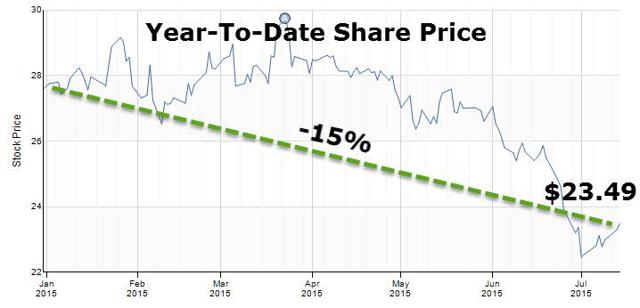Meet The Mastermind Behind This REIT Merger
Around two weeks ago, I wrote an article on the proposed merger between Chambers Street Group (NYSE:CSG) and Gramercy Property Trust (NYSE:GPT). As you may recall, on June 10, Bloomberg first reported that Chambers Street was putting itself on the block "after receiving at least one offer from a competitor."
Then around three weeks later, that rumor became reality. Chambers Street and Gramercy Property said they were combining forces through a merger into a combined entity that was expected to be valued at around $5.7 billion (based on EV).
At one time, I owned both Chambers Street and Gramercy, and earlier this year, I parted ways with Chambers Street.
Gramercy has been a dream REIT though, and while I was reluctant to hop in early, I have been very pleased with the overall performance, especially when the dividend was reinstated. I knew that my initial investment in Gramercy was somewhat speculative given the volatile history of the previous operating model.
However, I decided to take the initial dip after examining the experience of the management team, namely Gordon Dugan. As a shareholder in W.P. Carey (NYSE:WPC), I was well aware of Dugan's track record there, and I was hoping to see his leadership skills move the needle again at Gramercy.
So I'm quite comfortable with Dugan at the helm, and while there is integration risk associated with the merger of near-equals, I recognize that the Chambers Street deal is not the first transformation portfolio that Dugan has masterminded. On the surface, the transaction looks complex, yet my interview this week with Dugan provides me with comfort that my principal is safe.

Brad Thomas (BT): The CSG deal appears to be a big step for GPT - upon completion, the total enterprise value (or TEV) of the combined company is expected to be 40 percent larger than GPT. How are you preparing for integration? What costs savings do you expect from this combination?
Gordon Dugan (GD): The proposed transaction is a merger between CSG and GPT and we will have the benefits of combining the capabilities of both of our respective platforms. Our portfolios are very complementary with lots of market overlap so we believe the combined portfolio can be managed more efficiently through this combination.
As a result, we expect material cost savings that will benefit both set of shareholders. We estimate we will be able to save shareholders approximately $15MM a year through this combination, and those savings flow to the bottom line and increase FFO/AFFO per share.
The integration of systems and financial reporting can begin prior to closing and coincidentally both entities operate on the same accounting platform (Yardi), so this should be a relatively smooth process.

BT: What were the key drivers that you considered in looking at this merger?
GD: We are very asset quality focused in anything we look at. We focus on assets that are well suited to their respective markets and that have the ability to be re-leased or sold in the event that you lose a tenant. In reviewing the CSG portfolio, we were very impressed by the overall quality of the assets that they own - The CSG team has assembled an institutional quality portfolio with high quality buildings located in major markets throughout the US with the features and amenities that would make them competitive in their respective markets.
Continue reading this article here.
Brad Thomas is the Editor of the Forbes Real Estate Investor.
more



